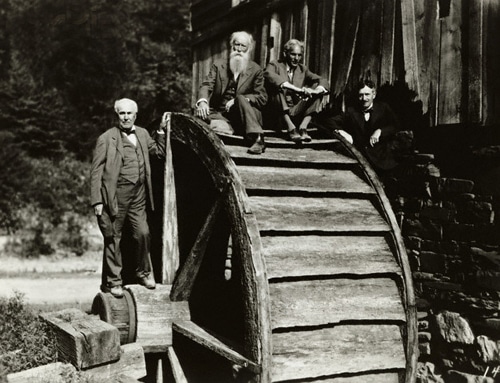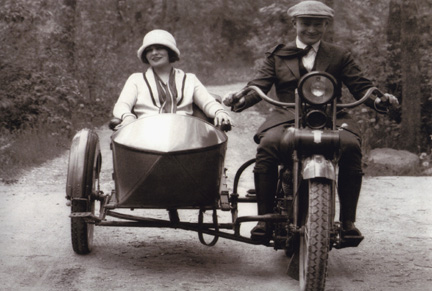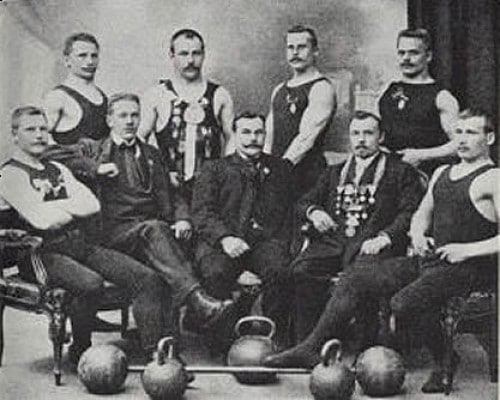
Editor’s note: This is a guest post from Pavel Tsatsouline.
The kettlebell swing is the Russian army knife of exercises. What else do you call an exercise that can increase both a professional powerlifter’s strength and an elite marathoner’s endurance?
The swing zaps fat without the dishonor of aerobics, and it develops explosive power and never-quit conditioning. Since I introduced the kettlebell to the West a decade and a half ago, the swing has become a staple in the training of elite fighters and athletes, and has spurred a number of scientific studies that have documented its benefits.
Now it is your turn to behold the power of the Russian kettlebell.
Getting Started
When you start working out with kettlebells, begin by learning the “Hard Style” swing. A ballistic builder of both strength and conditioning, the swing is the center of the KB universe and being able to do one safely and effectively is a prerequisite for other kettlebell skills. The better your swing, the better you will be at the other lifts. Before we get to proper form, here are few things to keep in mind:
- Start by buying a kettlebell from a reputable manufacturer. A 24kg/53lb bell is about right for most guys to start with. Even at this weight, the force or load of the bell is upwards of 500lbs for a brief moment at the bottom of the swing!
- The kettlebell swing demands deadlift competence. It’s basically an aggressive deadlift that projects the power forward rather than up. Once you have the deadlift down pat — heels planted, shins vertical, spine neutral, abs braced, etc. — you are ready to take on the swing.
- Swing barefoot or in minimalist shoes. You want to swing from a neutral and natural stance.
Like a punch, the swing takes hours to learn and a lifetime to master. Following the basic instructions below will get you started.
The Kettlebell Swing
The basics of the movement are simple: Place a kettlebell on the floor in front of you. From a sumo deadlift stance, “hike pass” the bell back between your legs until your forearms make contact with your inner thighs. Explosively thrust your hips forward, launching the bell to your chest level. Don’t try to lift it with your traps or your back!
Cramp your glutes on the top of each rep. Guide the bell back between your legs for the next rep. Do all the reps without setting the bell down. Here’s how it looks:
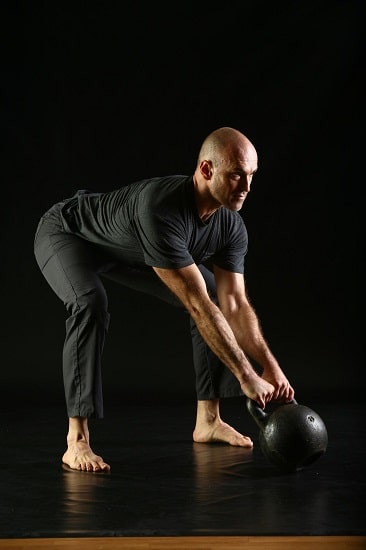
The kettlebell is slightly forward of an imaginary line between both feet. Notice that I reach for it while maintaining a neutral spine. This reach forward initiates the “hike.”
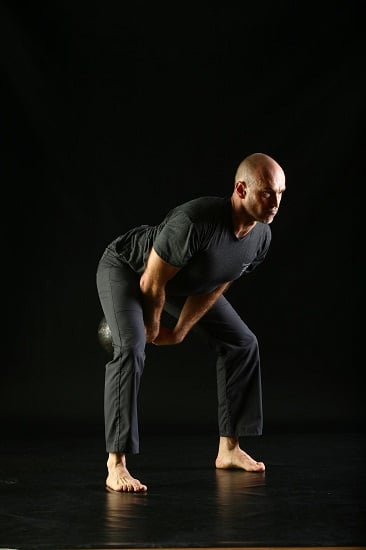
Notice the spine is neutral still (always). From this position, the kettlebell is swung to the top position, as demonstrated in the next photo.
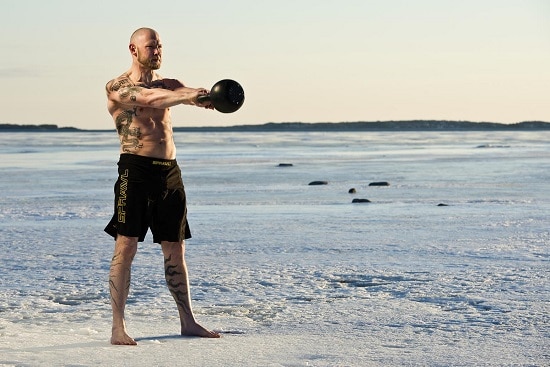
The top of the kettlebell swing.
Beyond the basic movements, here are a few things to keep in mind as you perform the swing:
- The back is neutral. The neck is slightly extended or neutral on the bottom of the swing.
- The heels, toes, and balls of the feet are planted and the knees track the toes.
- The shoulders are packed (connected to the body).
- The kettlebell handle passes above the knees during the backswing.
- The arms are straight in the bottom position.
- There is no forward knee movement on the upswing.
- The body forms a straight line at the top of the swing: the hips and knees extend fully, the spine is neutral.
- Sharply inhale through your nose on the way down, exhale with a “Kiai!” on the way up.
- The abs and glutes visibly contract at the top of the swing.
- The kettlebell floats momentarily at the top of the swing.
A Kettlebell Swing Workout Routine
For the first few weeks, practice your swings in sets of 10, taking as much rest between sets as you want. Do it every day if possible. When you can comfortably do 10×10 in 10 minutes, you are ready for the following workout.
Throw a pair of dice two times and add up the numbers. For example: (2, 5) + (2, 6) = 15. This is the length of today’s workout. (It can be anywhere from 4-24 min, but for the first couple months put a ceiling at 12 min.) Your task is to perform as many perfect, crisp swings as possible using a particular set and rep scheme in that timeframe without coughing up a lung.
You are to use rep ladders of 5, 10, 15, 20 reps (50 total). A rep “ladder” refers to multiple sets of the same exercise done with the same weight in which reps are progressively increased. When you have reached the top “rung,” you start over at the bottom rather than pyramid down: 5, 10, 15, 20… 5, 10, 15, 20…5, 10, 15, 20.
A ladder allows one to handle a high training volume without burning out and enables a focus on technique. The ladder is one of the most foolproof methods of getting strong.
Do not stand or sit while resting; walk around and shake off your muscles. This is important for a number of reasons I am not going to bore you with.
Listen to your body and do the next set when you feel ready. If you begin the next set and you notice that the form/quality or speed of the movement deteriorates, then you know you didn’t wait long enough. The focus is on quality of movement.
Do the above swing workout 3-4 times a week. Carry on your upper body training as usual. Adding some sort of a squat is a good idea but it is also okay to do no other lower body exercises for a little while. Stick to this plan for a couple of months and you will find out just how powerful this exercise is.
Russian kettlebell power to you!
Be sure to listen to our podcast on all things kettlebells and the psychology of training:
___________________________
Pavel Tsatsouline is the chairman of www.StrongFirst.com. A former Soviet Special Forces instructor and an SME (subject matter expert) to elite US military and law enforcement special operations units, Pavel introduced the Russian kettlebell to the West in 1998 and started the kettlebell revolution. His latest book is Kettlebell Simple & Sinister.
Tags: Exercises



